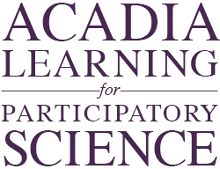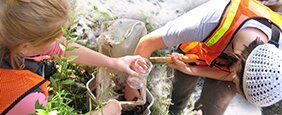Unit Overview
There are several means of scientific communication, among them journal articles, oral presentations, and posters. Here, students communicate the results of their work in the form of a poster, which they will present to a larger group of students, parents, the public, or scientists toward the end of the project or school year. If students have kept good notes and saved the results from each of the previous units, making the poster will be about summarizing and communicating that information and thinking more about what it means.
The poster includes all the stages of the research project – from gathering the background information, to designing the project, to data analysis, and drawing conclusions from the work. This last stage is key and allows the students to see the transition from data – which are ‘facts’ or hard numbers – to interpretation, which can be more subjective and bring in scientific reasoning, judgment, and thinking about trade-offs. For example, what would they do differently or what would they investigate next time?
The assessment piece for this Unit then allows students to become peer reviewers for others’ posters, teaching them the skills of constructive criticism.
Although there are other means for communicating results, at this time we are supporting poster presentations. Poster presentations can be done in a variety of settings:
- Students can make presentations to other science classes.
- One school arranged for students to present to middle school science classes in the same district.
- Alternately your students can present their findings to older students. Have a parents’ night where family and community members can come to the school to see the posters and hear the students make presentations.
- Schedule a poster session at a school board or parent-teacher organization meeting.
The creation of a poster involves a great deal of material that is normally covered in an English class. Think about the possibility of team teaching this unit with an English teacher, possibly as a project that would receive both English and science credit. Students may think that the scientific poster is similar to art projects or ‘book report’ projects. It is not. The scientific poster tells the research story in linear fashion. It should be the researcher’s narrative from introduction to conclusion.
Rationale
Scientists need not only do research, but also present the results of that research to the scientific community, the public, and policymakers.
This unit focuses mostly on the mechanics of creating posters. But it is important to place all of this poster activity in a broader context: The goal of all this activity is to engage students in scientific discussion and argument.
For most students the word “argument” means a fight, a disagreement, or a personal attack. It is really important – a learning objective – to help them understand that scientific argument is something different—a discussion, challenge, approach to the research question from a different vantage point, and/or validation of a researcher’s findings.
As referenced in Unit 3, Activity 2 (Peer Review) there is an excellent discussion of this objective in Ready, Set, SCIENCE! published by the National Academies Press (2007).
One of the key ideas from this book is that you should begin by establishing the norms for scientific discussion in your classroom. This is not just a matter of good classroom control—it reflects what really happens in the profession of science. There are “rules of the road” that scientists follow as they critique each other’s work. Your class, too, should have clearly defined rules for its scientific discussion.
Objectives
- Students interpret and present their research results.
- Students participate in scientific peer review.
- Students understand that:
- Effective oral presentations and posters communicate scientific research
- Peer review will strengthen understanding
- Scientific discussion and argument are part of scientific research
- Scientific research is never “done”
- Data interpretation is different from data collection
- The same set of data can be used for many different scientific discussions
- It is all right if the data didn’t support the hypothesis; there is still great value in interpreting and presenting the results.
Instructional Strategies
Proper Planning and Preparation Prevents Poor Performance
Concepts and Relationships
- Scientific research is never “done”
- The same set of data can be used for many different scientific discussions
- There are several means of scientific communication
- It is necessary to make the transition from data collection to data interpretation
Vocabulary
Scientific argument—a discussion, challenge, and/or validation of a researcher’s findings
Scientific poster—a storyboard that describes a research project
Student Prerequisites
- Grammar and punctuation
- Sentence structure and paragraph development
Misconceptions
- Scientific argument is a fight or a personal attack
- I’ve made posters in art class so this is the same thing
- Good grammar, sentence structure, and spelling don’t count because this is science class
- The data didn’t support my hypothesis and I got it wrong so what’s the sense of writing about it

 Acadia Learning brings scientists, teachers, and students together in partnerships that result in useful research and effective science education.
Acadia Learning brings scientists, teachers, and students together in partnerships that result in useful research and effective science education.